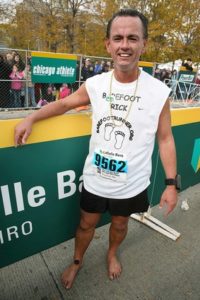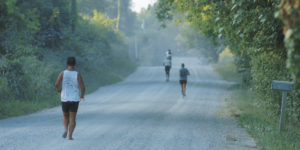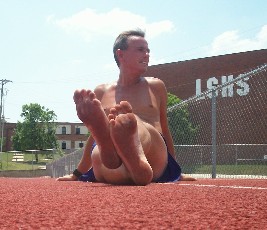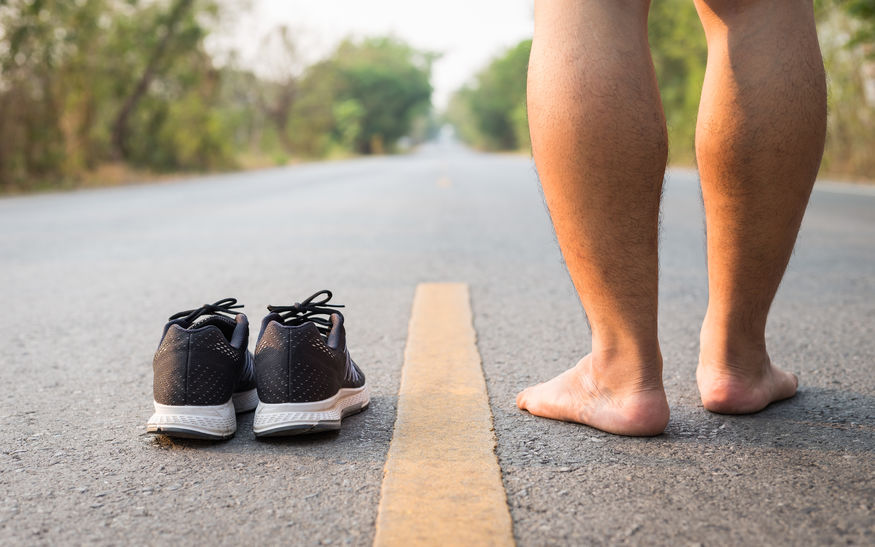Run faster, jump higher. The P.F. Flyers made that promise nearly 80 years ago spearheading decades of development and attention given towards performance-enhancing shoe wear. But what if the industry has been focusing on the wrong idea. What if rather than perfecting shoes, you merely took them off. Could going barefoot truly provide the optimal running performance? A growing number of experts believe it might. WellWell spoke with the Barefoot Runner himself, Rick Roeber, about the shoeless running technique and its unique advantages.
How much are you running these days? How does it compare to when you first started barefoot running?
When I started barefoot running back in my mid-forties, I was running around 70 miles per week. Now, at 64, I do closer to 28 miles per week. I also run a bit more on the treadmill now versus outside to avoid aches and pains.
Have you noticed any lingering health effects that you would attribute to the barefoot running versus the alternative? Do you think it’s helped you stay in better shape and your feet feel better?
Absolutely. I would’ve had to have knee replacements years ago if I never ran barefoot. In 2002 before I started barefoot running, my knees were shot after eighteen marathons running standard with shoes and I thought I was going to have to stop running altogether. But within a few months of switching to barefoot running I had no symptoms whatsoever on my knees and I still don’t really. The occasional tightness but I offset it with the treadmill.
What do you think it is about barefoot running that has had such a positive impact on your body?
Well, that’s just it: Positive impact. The negative impact is when you just run any way you want to—and I’m what I call a stupid runner with shoes because I would run too much, too fast—you don’t get the feedback from your body to control effort or form.
Can minimalist shoes, which attempt to mimic the feel of being barefoot, create a similar impact?
It’s a similar issue with minimalist shoes. They give you enough coverage to allow you to think you’re protected but, ultimately, they don’t expose you enough to develop a proper form. They create bad habits in the same way traditional running shoes can. But with barefoot running, it forces the body to adapt to move with the least resistance possible. You get immediate feedback from your body while barefoot running.
The research and scientific community’s stance on barefoot running seems to waiver every few years. Why do you think the findings and options are so inconsistent and inconclusive?
Look, as with most things, it’s not so simple. It’s a very subjective and personal experience. I think it has a lot to do with how you run with traditional shoes. For me, I run stupid with shoes so going barefoot helped me greatly correct my form and style. For other’s, it may not be the best option. There’s no one right way to run, it’s whatever is most effective for the individual.
 What has the reaction been like throughout the years when you’d show up to a run and people would see you warming up without shoes on?
What has the reaction been like throughout the years when you’d show up to a run and people would see you warming up without shoes on?
I mean, there’d be some cynical folks that would say, “Hey, you forgot your shoes” or other sarcastic type remarks but most people at races are very encouraging. When I’d get the most comments is while training. If I’m running alone on the street, people are always saying stuff like “Put some shoes on” driving by.
Why do you think that is?
People don’t like nonconformity or change. They don’t like to think that they’re doing something that may not be the best way and how dare someone suggest that their way is wrong or could be improved.
Logistically, how do you run barefoot year-round, in the winter or dead of summer? 
A lot of it comes down to pushing yourself and keeping moving. In the winter, I would layer up down to my ankles to create as much body heat as possible. In the summer, on the super hot streets, it can be a bit taxing but as long as you keep going and moving, it’s okay. You don’t really feel it if you’re running correctly because your feet are barely on the ground.
What advice do you have for people who want to try barefoot running?
Take it slow. If you go too much too early, you could certainly hurt yourself. Inch by inch. Mile by mile. Build up to your distance. If the first time you try barefoot running, you go ten miles you’ll be dissuaded very quickly because it’s going to tear up your feet. But if you manage it and take your time, your feet and body will begin to evolve and adjust. Then you may ultimately find yourself preferring or even enjoying it.
 About Rick Roeber
About Rick Roeber
Rick Roeber, also known as Barefoot Rick, is a well-known barefoot runner that uses his barefoot running ministry to help addicts, alcoholics, and the homeless. Roeber has been featured in various publications including, The Wall Street Journal, Fox News, and The Associated Press.
Learn More At barefootrunner.org












